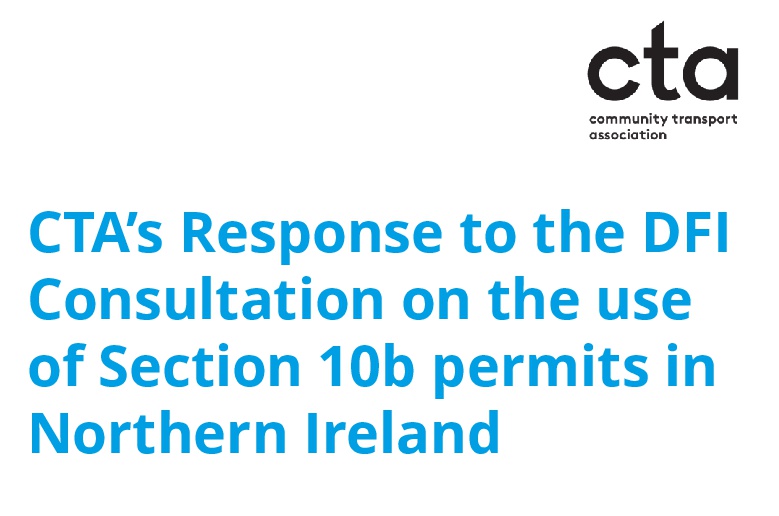-

CTA’s response to the Department for Infrastructure’s consultation on the use of section 10b permits in Northern Ireland
-
13th December 2017
-
-
by Tim Cairns
Director for Northern Ireland
Last week the consultations on updated guidance on driver licensing and the use of Section 10B Permits in Northern Ireland closed. You can read CTA’s response to the consultation here.
CTA’s challenge to the Department for Infrastructure (DfI)
This has been a challenging time for members in Northern Ireland. Unlike the rest of the UK, Northern Ireland does not have a government in place to oversee the implementation of changes to guidance or regulation. As a result, community transport operators in Northern Ireland have been excluded from the national debate currently taking place in the rest of the UK.
CTA had argued that Northern Ireland, given the lack of political oversight, should follow the process underway in Great Britain. This would give a level of confidence to the process. Unfortunately, the Department for Infrastructure followed a different path. We have continued to press the DfI to refrain from implementing the guidance in the consultation documents until the GB process has concluded. The DfI are currently considering that request. It is important that, whatever happens across the UK, users and operators of community transport are clear about the law and its interpretation. CTA will continue to press the case for members in Northern Ireland to ensure that their voice is not lost in the national debate.
In our response to the Department for Infrastructure CTA contends:
1) That the DfI re-examine their legal advice. The definition of non-commercial is not clearly established in law and the DfI have a choice to make in how they define this term. CTA contends that they should examine alternative ways of giving effect to regulation 1071/2009.
2) That the impacts of any guidance change be properly assessed. Before the guidance can be issued, the DfI should fulfil their legislative obligations under the Northern Ireland Act.
3) No mitigation measures have been brought forward. CTA has challenged the DfI to bring forward their proposals to properly compensate groups who relied upon their guidance and to support the vulnerable members of society who will inevitably be left without access to transport.
4) The guidance as currently drafted does not provide the necessary level of clarity and transparency. It is still unclear who can and cannot drive a minibus, or how this guidance relates to the private hire market.
5) CTA is concerned that the consultation process has been predetermined. The DfI must be open to question whether there are better public policy options to bring about the necessary changes required.
What are the next steps?
The DfI should consider carefully the responses it has received to the consultation process. CTA will continue to press the DfI to ensure that any changes to its guidance will ensure that the community transport sector in Northern Ireland is left in better shape and that the most vulnerable in Northern Ireland will continue to receive the transport they need.
CTA will continue to press other Executive Departments (Health, Education and Communities) to meet their obligations to organisations affected by these changes.
2017 has been a challenging year for community transport in Northern Ireland. In 2018 CTA is committed to ensuring that people are afforded access to the transport solutions they require and that the people who rely on community transport in Northern Ireland are not placed in a disadvantageous position compared to the rest of the UK.
-
-
- About CTA
- /
- CTA Membership
- /
- CTWeek24
- /
- Policy & Research
- CommunitySolutions: A Manifesto for the Next UK General Election
- Our Campaigning Guide for Community Transport
- Our Policy Work
- Join Our Mapping England Passenger Survey
- Aneurin Bevan Transport to Health
- Climate Action in Scotland
- conneCTing England Programme
- Mapping Scotland Project
- Mapping Wales
- Mapping England
- Tackling Loneliness in England
- Healthy Communities in Scotland
- /
- Advice & Support
- /
- Training
- /
- Events
- /